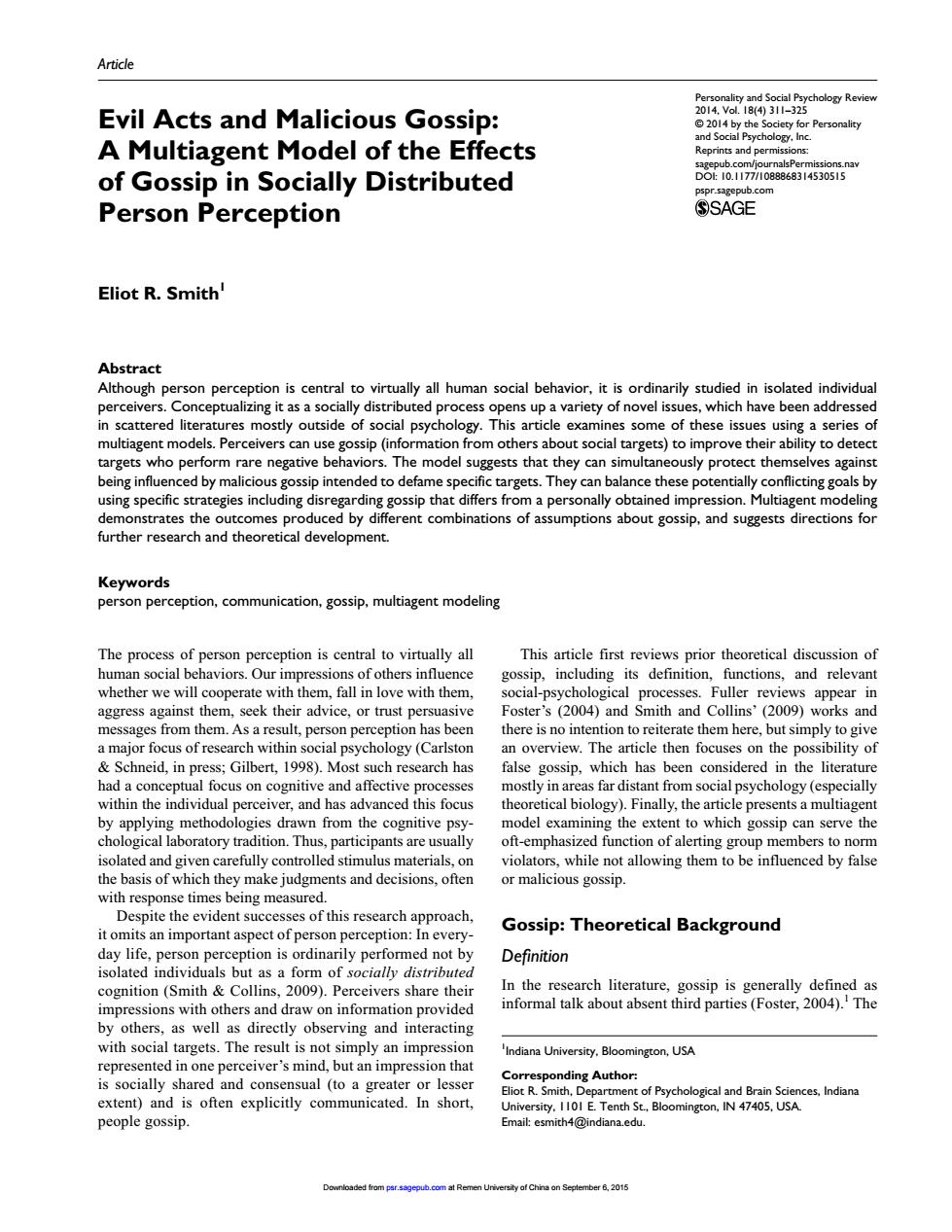正在加载图片...

Article Evil Acts and Malicious Gossip: 214.V Review A Multiagent Model of the Effects of Gossip in Socially Distributed Person Perception SAGE Eliot R.Smith Abstract Although person perception is central to virtually all human social behavior,it is ordinarily studied in isolated individua onceptuali zing it as a sc whic h have been address d li distributed process s.Pees m targetswho perform rare neative behaviors The model susts that they cansmutaousy protect themseves against being influenced by malicious gossip intended to defame specific targets.They can balance these potentially conflicting goals by sing specn c strategies including disregarding g gossip that m a personally obtaine further research and thepretical development out gossi ords erson perce ption munication,ossip,multiagent modeling The process of ral to virtually all This inf月 and rele whether we will cooperate with them.fall in love with them processes.Fuller reviews ear in aggress against the seek the advice,or trust persuasive Foster's (200 and Smith an Collins 2009 me a resu choption h Schneid.in press:Gilbert.1998)Most such research has sin which has heen considered in the liter had a conceptual focus on cognitive and affective processes mostly in areas far distant from social psychology (especially the individu f,and has advance his focu cal b .Finally,the arti le pre nts a multiage hasized fun tion of ale n g isolated and given carefully controlled stimulus materials or violators.while not allowing them to be influenced by false the basis of which they make judgments and decisions,often or malicious gossip. h response m sure it omits an imnortant aspeet of nerse Gossip:Theoretical Background day life,per son perception is ordinarily performed not by Definition isolated indivi torm of socially distrib cognition (Sn 09). Perceivers share In the research literature,gossip is generally defined as informal talk about absent third parties (Foster,2004).The by others,as well as directly observing and interacting with social targets.The result is not simply an impression 'Indiana University,Bloomington.USA represented n one per eiver's mind,but an impression tha and is ofen (d In short people gossip. 0 Personality and Social Psychology Review 2014, Vol. 18(4) 311–325 © 2014 by the Society for Personality and Social Psychology, Inc. Reprints and permissions: sagepub.com/journalsPermissions.nav DOI: 10.1177/1088868314530515 pspr.sagepub.com Article The process of person perception is central to virtually all human social behaviors. Our impressions of others influence whether we will cooperate with them, fall in love with them, aggress against them, seek their advice, or trust persuasive messages from them. As a result, person perception has been a major focus of research within social psychology (Carlston & Schneid, in press; Gilbert, 1998). Most such research has had a conceptual focus on cognitive and affective processes within the individual perceiver, and has advanced this focus by applying methodologies drawn from the cognitive psychological laboratory tradition. Thus, participants are usually isolated and given carefully controlled stimulus materials, on the basis of which they make judgments and decisions, often with response times being measured. Despite the evident successes of this research approach, it omits an important aspect of person perception: In everyday life, person perception is ordinarily performed not by isolated individuals but as a form of socially distributed cognition (Smith & Collins, 2009). Perceivers share their impressions with others and draw on information provided by others, as well as directly observing and interacting with social targets. The result is not simply an impression represented in one perceiver’s mind, but an impression that is socially shared and consensual (to a greater or lesser extent) and is often explicitly communicated. In short, people gossip. This article first reviews prior theoretical discussion of gossip, including its definition, functions, and relevant social-psychological processes. Fuller reviews appear in Foster’s (2004) and Smith and Collins’ (2009) works and there is no intention to reiterate them here, but simply to give an overview. The article then focuses on the possibility of false gossip, which has been considered in the literature mostly in areas far distant from social psychology (especially theoretical biology). Finally, the article presents a multiagent model examining the extent to which gossip can serve the oft-emphasized function of alerting group members to norm violators, while not allowing them to be influenced by false or malicious gossip. Gossip: Theoretical Background Definition In the research literature, gossip is generally defined as informal talk about absent third parties (Foster, 2004).1 The 530515 PSRXXX10.1177/1088868314530515Personality and Social Psychology ReviewSmith research-article2014 1 Indiana University, Bloomington, USA Corresponding Author: Eliot R. Smith, Department of Psychological and Brain Sciences, Indiana University, 1101 E. Tenth St., Bloomington, IN 47405, USA. Email: esmith4@indiana.edu. Evil Acts and Malicious Gossip: A Multiagent Model of the Effects of Gossip in Socially Distributed Person Perception Eliot R. Smith1 Abstract Although person perception is central to virtually all human social behavior, it is ordinarily studied in isolated individual perceivers. Conceptualizing it as a socially distributed process opens up a variety of novel issues, which have been addressed in scattered literatures mostly outside of social psychology. This article examines some of these issues using a series of multiagent models. Perceivers can use gossip (information from others about social targets) to improve their ability to detect targets who perform rare negative behaviors. The model suggests that they can simultaneously protect themselves against being influenced by malicious gossip intended to defame specific targets. They can balance these potentially conflicting goals by using specific strategies including disregarding gossip that differs from a personally obtained impression. Multiagent modeling demonstrates the outcomes produced by different combinations of assumptions about gossip, and suggests directions for further research and theoretical development. Keywords person perception, communication, gossip, multiagent modeling Downloaded from psr.sagepub.com at Remen University of China on September 6, 2015